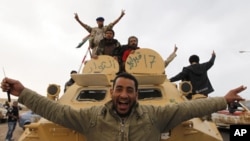Fighter planes and missiles from the international coalition are continuing to hit the forces of Libyan leader Moammar Gadhafi. The stated goal is to protect civilians, but many analysts say the international coalition has become, in essence, the rebels' air force. But who exactly are the rebels? In this report from Washington, our correspondent looks at the makeup of the Libyan opposition.
President Barack Obama recently told the American people the military attacks on Libyan government forces were aimed at preventing a massacre of civilians - especially in the rebel stronghold of Benghazi.
"The task that I assigned our forces - to protect the Libyan people from immediate danger and to establish a no-fly zone - carries with it a United Nations mandate and international support," said President Obama. "It is also what the Libyan opposition asked us to do."
But experts are wondering who is this opposition and who are the rebels fighting Ghadafi’s forces?
Ward Carroll is a former Navy radar specialist who flew in earlier no-fly zones over Iraq and Bosnia.
"I don’t think we have an answer for that," said Carroll. "They are not Gadhafi and I think that’s good enough at this point, obviously, for certain organizations and certain nations.”
Marc Ginsberg, former U.S. Ambassador to Morocco, says the Libyan opposition is made up of different personalities and groups.
"It’s a sort of 'Star War' assembly of characters and people who are clearly patriots, very decent people - I’m sure - journalists, opposition military officials who have broken with the regime, former diplomats - and then you’ve got Islamists," said Ginsberg. "The Benghazi section of Libya was basically an opposition stronghold to Gadhafi and it has a very strong Islamist character to it. So while there are very good people who are part of this opposition coalition, we really can’t say that we know for sure what their capacity is to govern Libya."
Retired Air Force General Mike Dunn, who commanded airmen patrolling no-fly zones, also asks - who are the rebels?
"It’s a poorly defined group of mutually hostile and suspicious tribes and factions that have thus far, at any rate, failed to coalesce into a meaningful military force," said Dunn. "We’d like to think this is a group of democratic Jeffersonian type of people that just are fighting for their freedom, when in reality we don’t know a lot about them."
So that begs the question, says General Dunn - who is the international coalition supporting?
Ambassador Ginsberg agrees with General Dunn that the rebels are not a cohesive military entity.
"The opposition is not an army," he said. "The opposition barely has any military means to accomplish the goal of fighting. Look how far they have to go: they have to go from Benghazi back across 450 miles [720 kilometers]of desert to attack Tripoli with what? All they have is at best, at best at this point in time, trucks with machineguns on them. We don’t know in the end what Gadhafi has in reserve and he has money to bring in mercenaries from southern Africa."
Experts agree that without the help of the fighter planes and missiles from the international coalition, the ill-equipped and poorly trained rebel force would have been defeated by now or be on the verge of defeat. Some analysts say the international coalition has become in essence, the rebels’ air force.
Mary-Jane Deeb, the head of the Africa and Middle East Division at the Library of Congress - and author of several books on Libya - says she is surprised that the rebels have such little military training because throughout the Arab world, 12 to 18 month military service is obligatory. And she says the Libyan opposition is essentially made up of urban, educated, young professionals.
"In that way, the Libyan opposition is not too different from the Tunisian and the Egyptian in the sense that they want jobs, they want a better distribution of the wealth, they want an open society, they want to be accepted as part of the global community rather than being treated as a pariah all the time," said Deeb. "They are non-ideological in the sense that they don’t espouse a particular view of life - they are not socialist, they are not fascist, they are not this, they are not that.”
Deeb says one can call them Libyan nationalists. They have set up a de facto government - a thirty-one member interim national council. Among its leading members are former Gadhafi Justice Minister Mustafa Abdul Jalil and Mahmoud Jibril, former head of Libya’s national council for economic development.
As for the influence of Islamist groups, Deeb says what is happening in Libya mirrors what is happening in other countries.
“The 20-somethings are turning away from Islamists," she said. "Now you do have an Islamic opposition and you always will have an Islamic extremism in the region. But this is not an Islamic movement. And it is not led by Islamists and it is not demanding the setting up of an Islamic Republic. It is not asking for the establishment of Sharia - Sharia law. It is not fought in the name of God, despite the fact that they move forward and they say “God is great.” It’s not that they stop being Muslims - of course they are Muslims - but that is not what is driving these movements, nor is it the case in Libya.”
Deeb says Islamist movements are growing weaker, not stronger. She says they will try to capitalize on what is happening, but they are not in the vanguard of the popular uprisings now spreading throughout North Africa and the Middle East.
Who Are the Rebels Fighting Libyan Government Forces?




